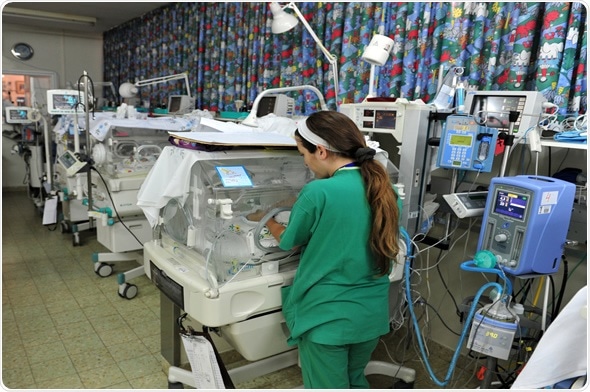Neonatal nursing is a subspecialty of nursing that involves the care of young infants. The term neonatal originates from the term neo, which means new, and natal, which means birth.
A neonatal nurse is responsible for the care of the first period of an infant’s life, usually the initial 28 days, although this can be extended in some cases. They care for all infants, including those who are healthy, those who have some complications, and those who are critically ill and require intensive care. Naturally, the level of care required for each infant will differ considerably according to the situation.
These first few weeks of an infant’s life carry significant changes, transitions, and challenges for the infant and the new parents, and the role of the neonatal nurse is important for this reason.

Medical staff in the premature infants department Barzilai hospital in Ashkelon, Israel. Image Copyright: ChameleonsEye / Shutterstock.com
Role
A neonatal nurse may perform several tasks, including
- Create and implement treatment care plan
- Monitor signs and respond accordingly
- Administer vaccine and other medications required
- Assist with diagnostic testing
- Operate medical equipment (e.g., ventilators, incubators, and phototherapy)
- Keep diligent record of infant signs and treatment
- Provide advice and support to family
The eventual aim is to discharge the infant and the mother from the hospital within an appropriate time frame. The neonatal nurse should pay particular attention to the preparation of the mother, who should feel comfortable in caring for the young infant when they leave the hospital.
Advancements in technology have significantly improved the likelihood that infants born with some complications will survive with minimal lasting effects. This has changed the way in which a neonatal nurse provides care and improved overall patient health outcomes.
Education and Training
As neonatal nursing is a specialization of nursing, it is necessary for a nurse to first undergo the appropriate training with an undergraduate degree in nursing, before beginning the specialization. There are several qualifications that may allow a nurse to specialize in neonatal care including neonatal nurse practitioner (NNP) and neonatal clinical nurse specialist (CNS).
Following registration as a nurse, a master’s degree of Doctor of Nursing Practice in Neonatal Nursing is then required. Upon graduation, the nurse must pass the National Council Licensure Examination (NCLEX) to become registered and practice as a neonatal nurse in the United States. In other countries, the requirements may differ slightly, but additional study and experience are typically needed to acquire a specialization in nursing.
Nursery Levels
There are various levels of nurseries where a neonatal nurse may work, according to the level of care provided to infants in the nursery.
- Level I nurseries are designed for healthy infants born at least 24 weeks gestation without complications.
- Level II nurseries are designed for premature or sick infants who require additional care, special feedings, medication or treatment with oxygen.
- Level III nurseries are designed for premature or sick infants who require intensive care with high-tech or specialized equipment
- Level IV nurseries are designed for infants who have a complex health condition that may require surgery or other advanced treatment techniques.
Some neonatal nurses work in all levels of nurseries but their expertise is more useful in level II through to level IV.
References
Further Reading
Last Updated: Dec 29, 2022